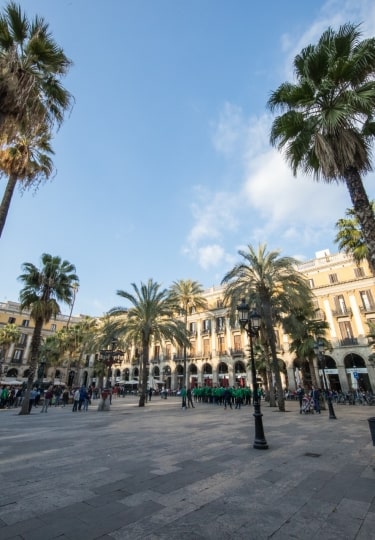As Spain’s most visited destination, Barcelona is famed for its outrageous architecture, superb contemporary art scene, food markets, and a string of golden urban beaches. As the capital of Catalunya, it has its own vibe, and language; you’ll hear Catalan being spoken more than Castilian Spanish.
Originally confined to the one-walled Gothic Quarter, Barcelona has expanded over the centuries into a city of distinct neighborhoods, each with its own character, architecture, and food scene. Whether you’re looking for world-class shopping, rooftop cocktail bars with a view, or tasty tapas on a cobbled square, Barcelona does not disappoint.
Here are some of the very best neighborhoods in Barcelona to explore.
The Gothic Quarter
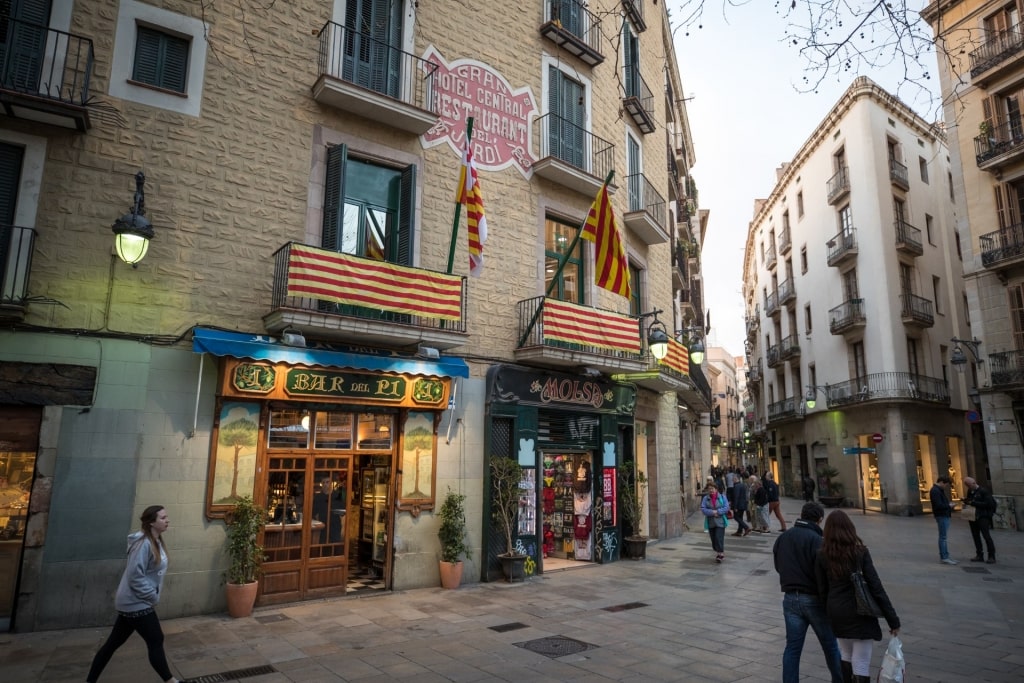
Gothic Quarter
There’s no better barrio in which to begin your Barcelona adventure than the place where it all started. As the heart of Barcelona’s old city, the Gothic Quarter consists of historical monuments, cultural museums and a labyrinth of cobbled streets.
Running along its southern flank is Las Ramblas, the city’s most famous street, a series of boulevards connecting the busy Plaça de Catalunya square with the seafront.
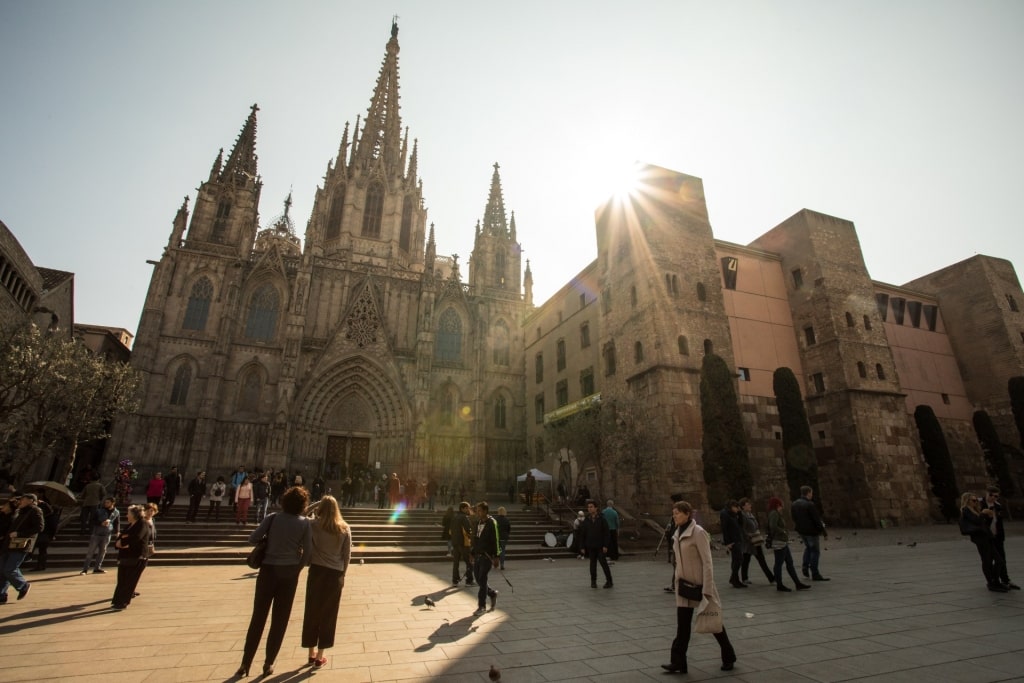
Barcelona Cathedral, Gothic Quarter
At the center of it all is Barcelona Cathedral, the Catedral de la Santa Creu i Santa Eulàlia, dating all the way back to the 13th century and named after a young girl who was martyred in the time of the Romans.
An entrance ticket also includes access to the cloister and garden, complete with 13 resident geese—one for every year the unfortunate Eulàlia lived.
As with many old cities, Barcelona’s Gothic Quarter was built around squares, and these were the centers of life. Plaça del Pi, named after the church of Santa Maria del Pi, is a bustling area of shops, bars, and a weekend art market.
Just off the Ramblas is Plaça Reial, a beautiful plaza boasting contemporary neo-classical style and dotted with palm trees. The lampposts you see were designed by the legendary Catalan architect Antoni Gaudí.
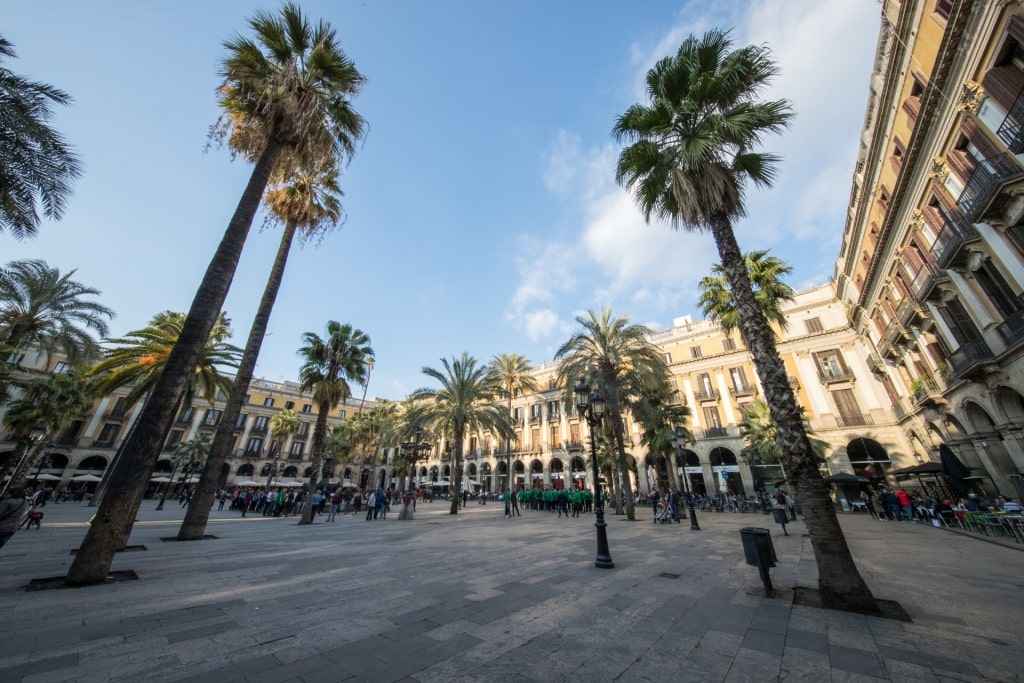
Gothic Quarter
With so much sightseeing, you’re bound to work up quite an appetite. Get your coffee fix at Satan’s Coffee or go all-out with a decadent brunch across the square at Bistrot Levante. Or feast on inventive tapas at La Alcoba Azul near the cathedral.
Raval
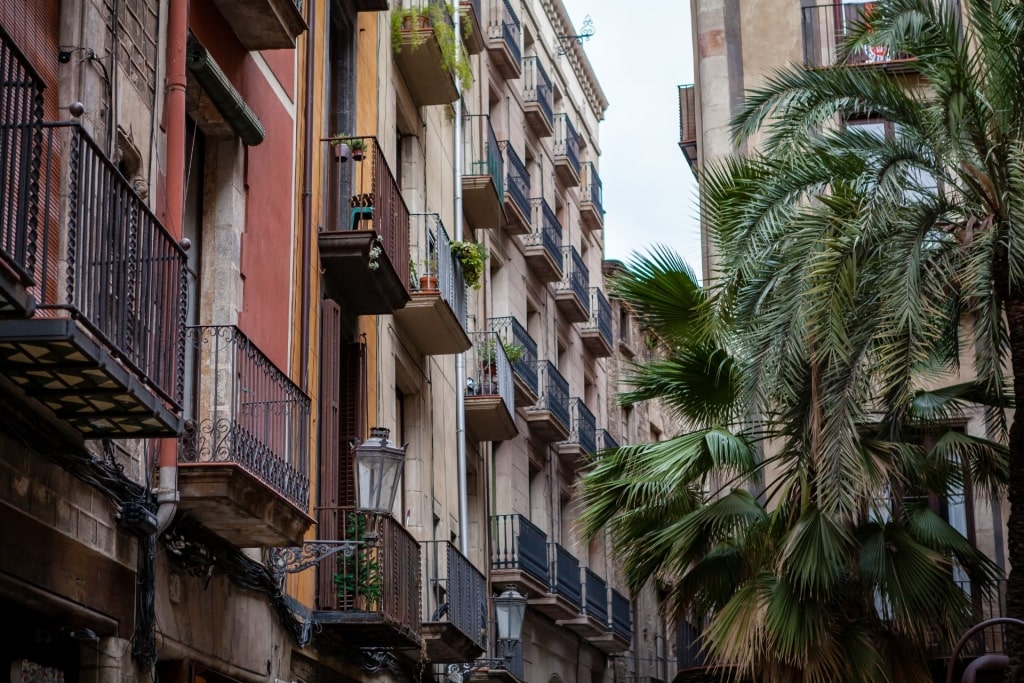
Raval
Mention “Raval” and you’re bound to get mixed reactions. The truth is that this neighborhood, separated from the Barri Gotic by the Las Ramblas boulevard, is in the midst of a renaissance of sorts.
There’s still a lot of grit amidst the glamor in what was once a particularly seedy part of town. Now, some of the city’s top cocktail bars, restaurants and independent designer boutiques are all located here, making it a round-the-clock hipster hangout.
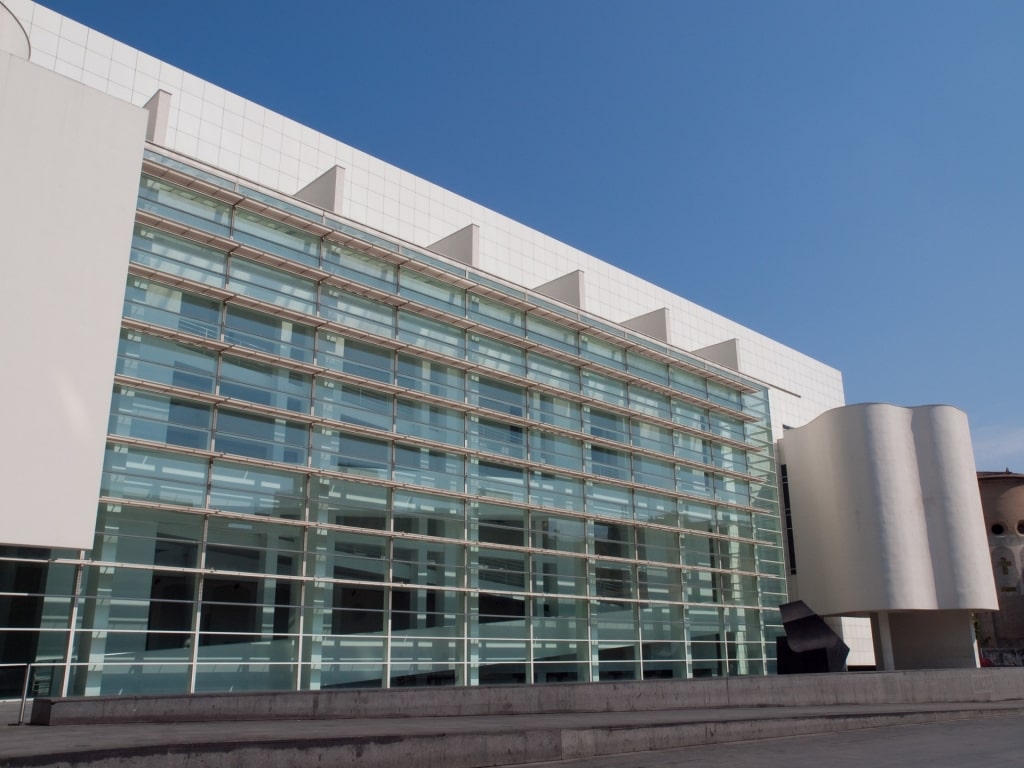
Museu d’Art Contemporani de Barcelona, Raval
Art reigns supreme in the Raval, especially the work featured at the Museu d’Art Contemporani de Barcelona (MACBA). The museum features both permanent and rotating exhibits, with a focus on artwork from the second half of the 20th century.
Other artistic highlights include Gaudí’s Palau Güell and the Centre de Cultura Contemporània de Barcelona (CCCB).

Boquería Market
Come lunchtime, have your pick of eateries and food stalls at the famous Boquería market on the Ramblas, or head to Joaquín Costa for the best restaurants Raval has to offer. Two Schmucks and its “five-star dive bar” theme has earned it major street cred; the bar is currently ranked among the top in the world.
Another local favorite is Cañete, an upscale restaurant specializing in classic dishes like seafood paella and duck cannelloni.
El Born
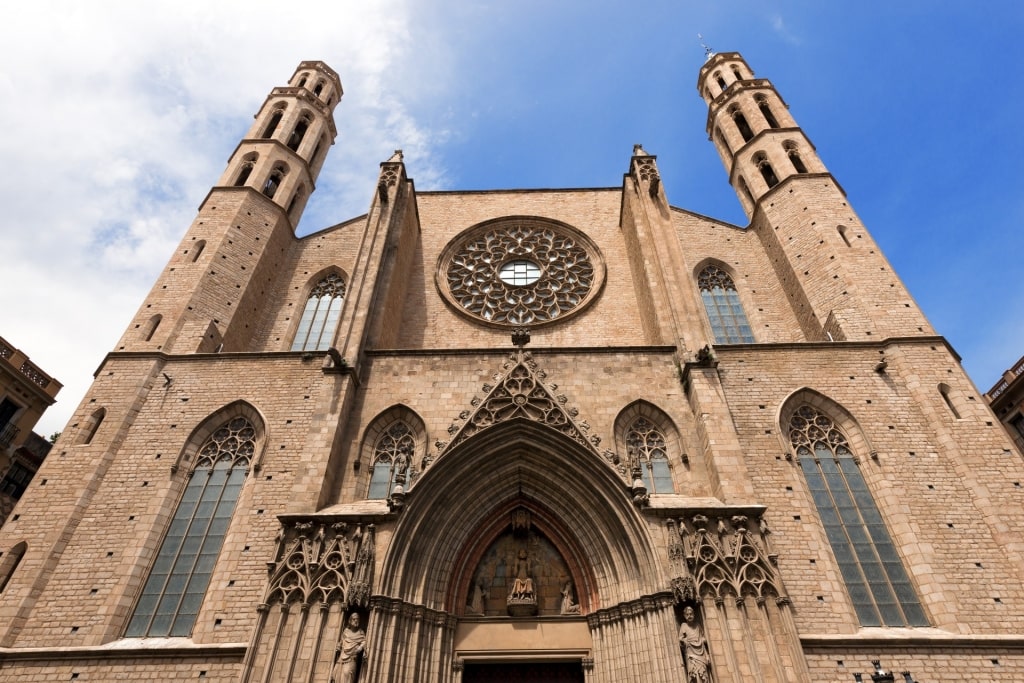
Basilica of Santa Maria Del Mar, El Born
Separated from Barri Gotic to the south by the busy Via Laitana, the two Barcelona neighborhoods share a glimpse into centuries past.
El Born is home to the Basilica of Santa Maria Del Mar, a shining example of the Catalan Gothic architecture that Spain is known for and built entirely by the people during the 14th century. It took 55 years to build, brick by brick, and many workers died before seeing its completion.

Palau de la Música Catalana, El Born
Another sight worth seeing and a stunning example of Catalan modernist style is the Palau de la Música Catalana. It was built in the early 1900s and was later declared a World Heritage building by UNESCO.
Don’t miss the Picasso Museum, housed in a series of grand old townhouses on Carrer de Montcada. This magnificent collection includes some 4,000 of the artist’s works, from sketches to several paintings from his famous Blue Period in the early 20th century.
Take a stroll through the Mercat de Santa Caterina, a former church and convent that was restored and reopened in 2005. The colorful roof, which you can spot from most high-in-the-sky city viewpoints, was designed exactly with that purpose in mind.
Once inside, you’ll find an array of Barcelona food stalls and restaurants where you can sit down and enjoy freshly caught seafood.
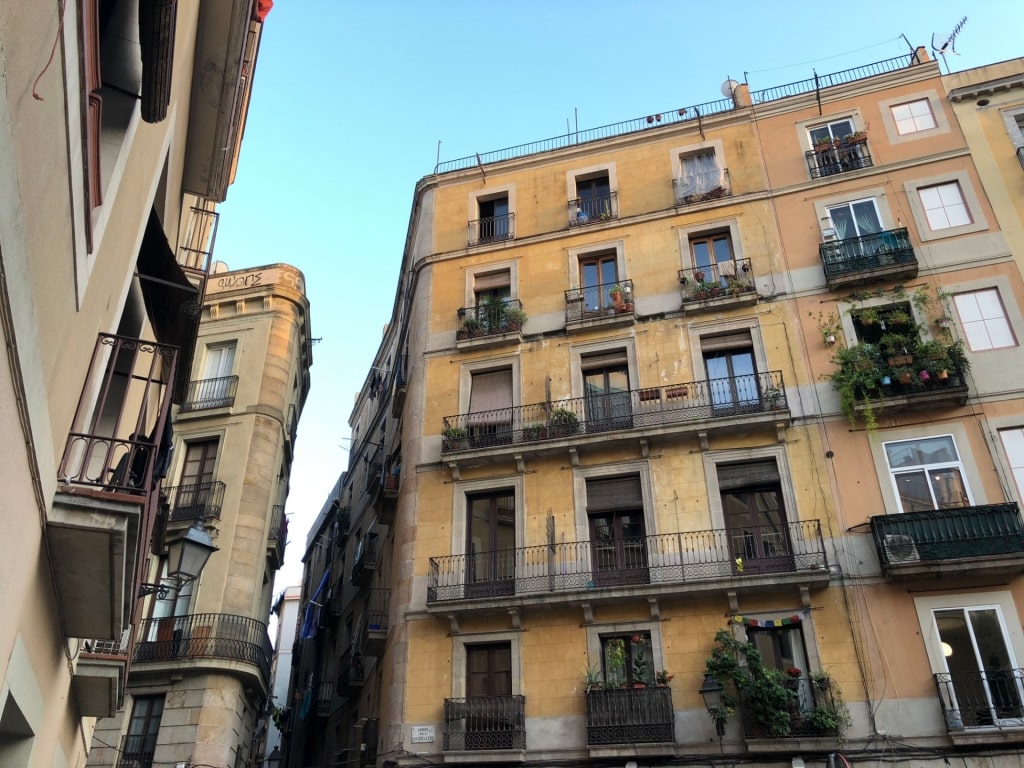
El Born
Hidden down alleys and backstreets you’ll find hole-in-the-wall cafes, tavern-style bars and boutiques of every kind. La Comet is a go-to for women’s clothes, jewelry and accessories. The brand is eco-conscious and instead of using paper tags on their items, tags are made from seeds that you can plant.
Patisseria Hofmann, both a bakery and shop, has some of the best mascarpone croissants around, while long-standing establishments like Cal Pep are renowned for their tapas.
Barceloneta
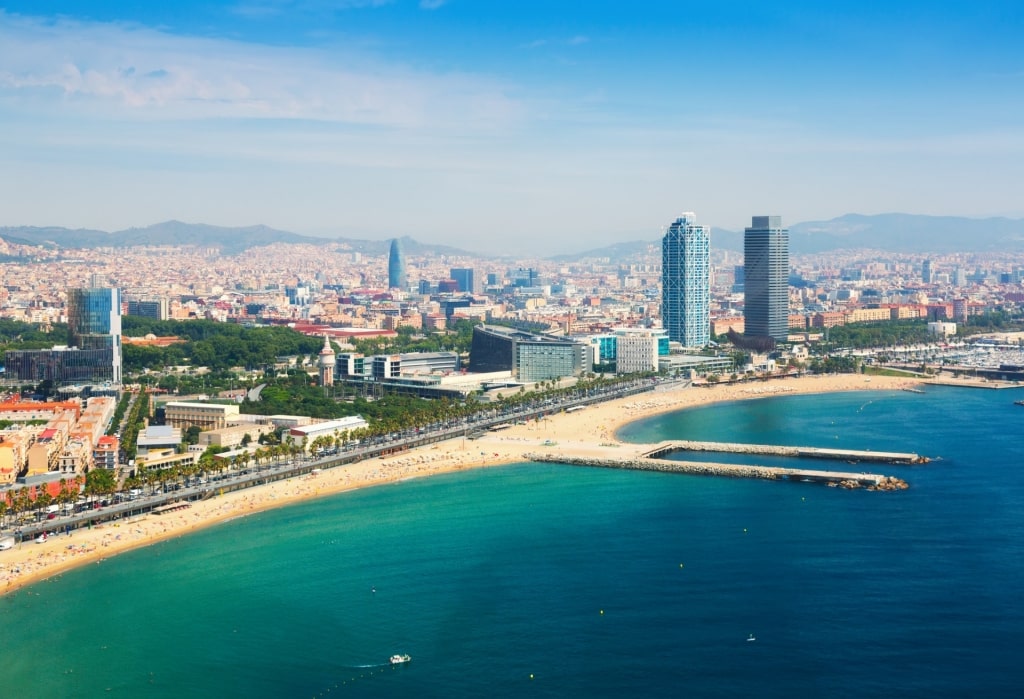
Barceloneta
The beaches of Barcelona are ranked among some of the top urban sunspots in the world, so it might be surprising to learn that they are actually man-made. There were hardly any beaches in Barcelona until 1992, when the city was gearing up to host the Summer Olympics.
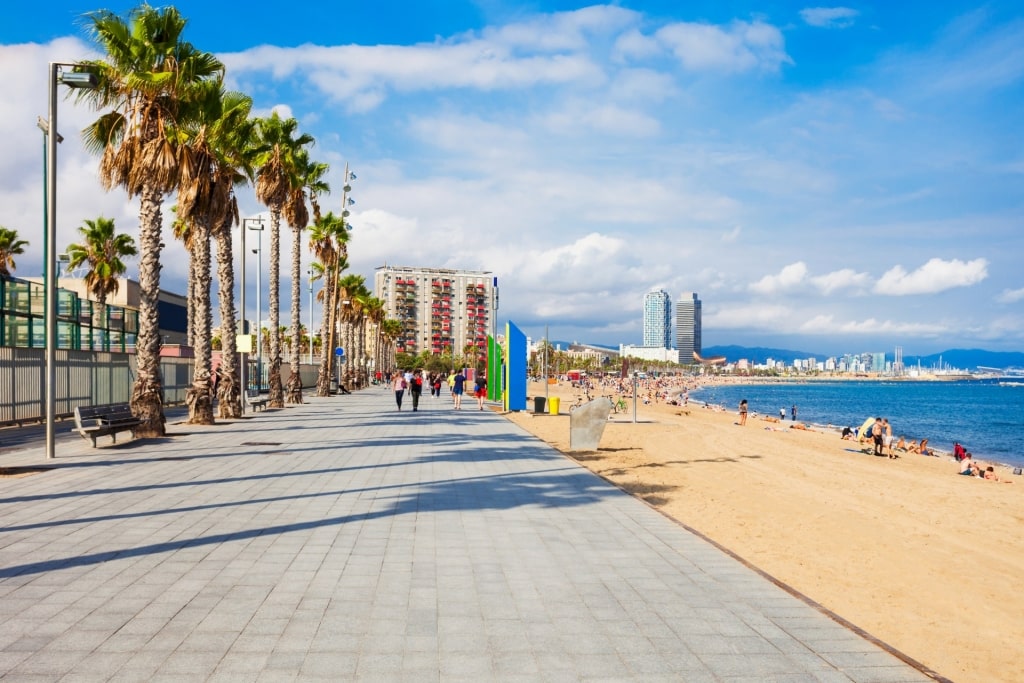
Barceloneta
Previously an industrial area and before that, a fisherman’s village in the 18th century, Barceloneta has a true “rags to riches” history. Today, in its gentrified form, it is easily one of the best neighborhoods in Barcelona.
Be warned: it gets very crowded here, so keep an eye out for rollerbladers, skateboarders and bikers weaving among the foot traffic along the promenade
Architecturally, there’s quite a contrast in Barceloneta. The sail-shaped W Hotel at the southern tip of the beach has become an iconic high-rise in the city as a whole, with the building jutting into the sea and its glass exterior reflecting the waves.

Estació de França
On the border of Barceloneta and El Born, you’ll find Estació de França, a station built in 1929 and designed by architect Pedro Muguruza, featuring Art Deco and art nouveau details.
The great thing about Barceloneta is that it caters to all tastes. On the high end, there’s Eclipse, a 360-degree bar touting a panoramic view of the Mediterranean.
Then there’s La Cala, a charming café with colorful tables set among cobbled streets. Despite being mere steps from the beach, it’s easy to miss this canopied, cozy indoor/outdoor cafe. There are beach bars all along the waterfront, too, buzzing on summer afternoons.
L’Eixample
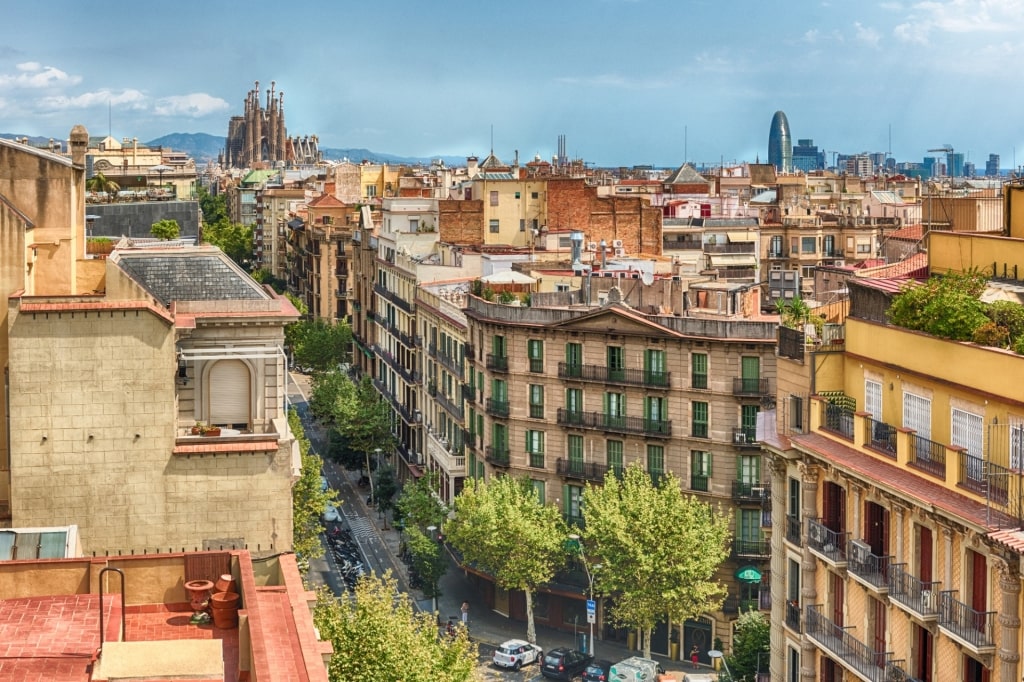
L’Eixample
Before the walls of the old city were demolished, L’Eixample was considered a different city. L’Eixample literally translates to the “Expansion District” and today, it comprises six different neighborhoods including Sagrada Familia and Sant Antoni.

Casa Milà, L’Eixample
Start your journey at Placa Catalunya and walk north toward Passeig de Gràcia. In addition to some of the best shops in Barcelona flanking either side of this street, you’re met with two of Antoni Gaudí’s most famous works: the Casa Batlló, its roof shaped like a dragon’s back, and the undulating Casa Milà, or La Pedrera.
Both “houses” are available to the public for audio-guided tours.
You can also participate in more interactive experiences such as live music or champagne toasts on the roof. Right next to Casa Batlló is Casa Amatller, a Modernisme style building designed by Catalan architect Josep Puig i Cadafalch.
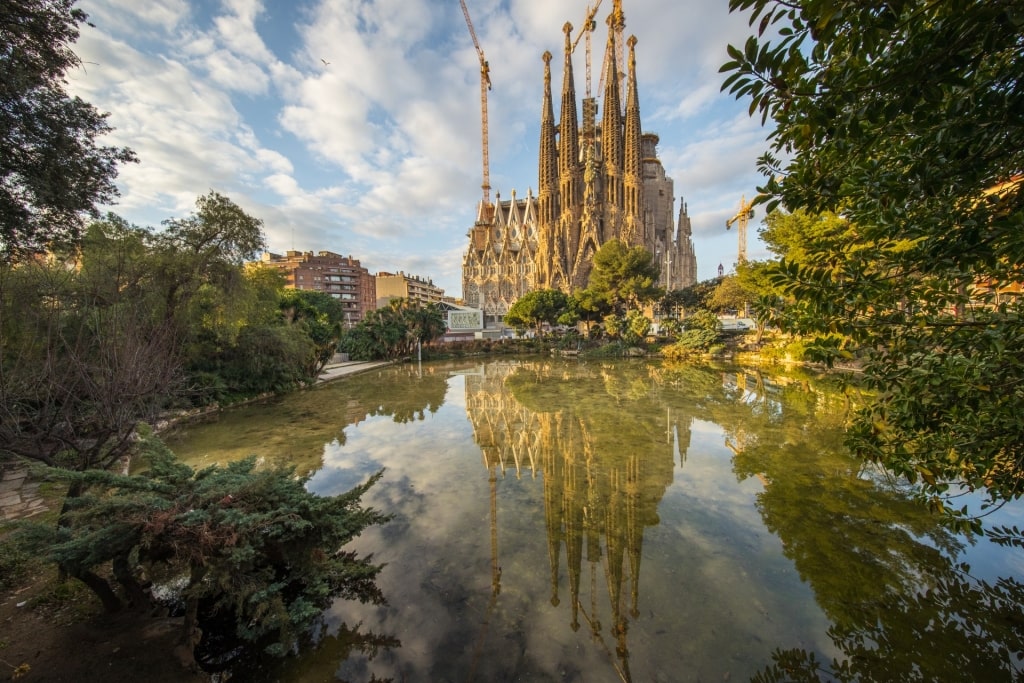
La Sagrada Familia, L’Eixample
As one of the most beautiful places in Spain, La Sagrada Familia needs no introduction. Although still not complete, this enormous cathedral is probably Gaudí’s most well-known structure.
After taking a tour of the inside of the church, make sure to get a good look at the exterior, too. The different facades of this Spanish landmark depict the parts of Jesus’ life, from his birth to his death—the latter of which is depicted with skeletal figures that resemble bones.
If you have time, take a ride up the elevator to the spindly towers for one of the best views in Barcelona.
Gracia
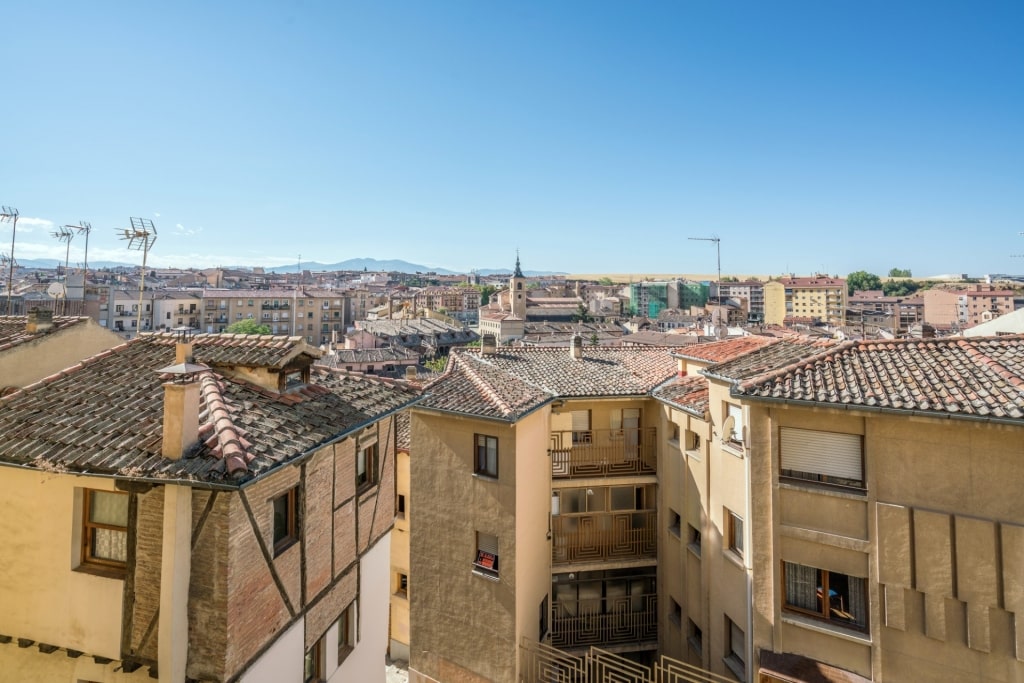
Gracia
Similar to L’Eixample being its own district, so too, was Gracia. The town of Gracia was eventually swallowed up by Barcelona and is now one of the most coveted Barcelona neighborhoods in which to live.
Gracia has long since been an area praised for its bohemian flair and appreciation for the arts and this energy is still a common thread weaving through the local community today.
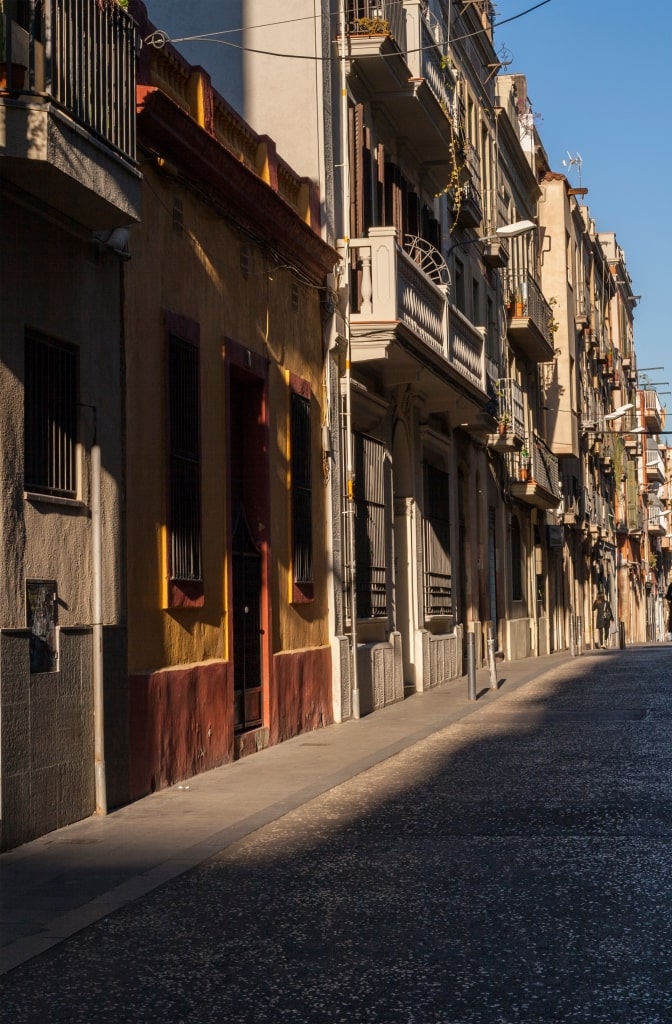
Gracia
As with most revamped neighborhoods, Gracia is more glamorous than gritty these days. Yet, the community-oriented feel and creative mentality is still alive and well.
Visiting the neighborhood is one of the best things to do in Barcelona with kids, as it’s dotted with more than 15 plazas, each packed with bars, restaurants, and shady trees. On any given day you’ll see kids biking through the plazas, dogs running to fetch the ball and restaurants setting up tables outside for lunch.
Get a kickstart to your day with a flat white at Syra, before exploring many of Gracia’s pedestrian-only streets. With more time, try your luck getting a table at Sabio Infante. Their top-rated brunch paired with eclectic decor is a real treat.
Restaurant Gut is a go-to for health-conscious, gluten-free Mediterranean fare, while La Pepita’s tapas and sangria are as authentic as it gets. For vegan Mexican fare, Gallo Santa really brings the heat.
Poble-Sec
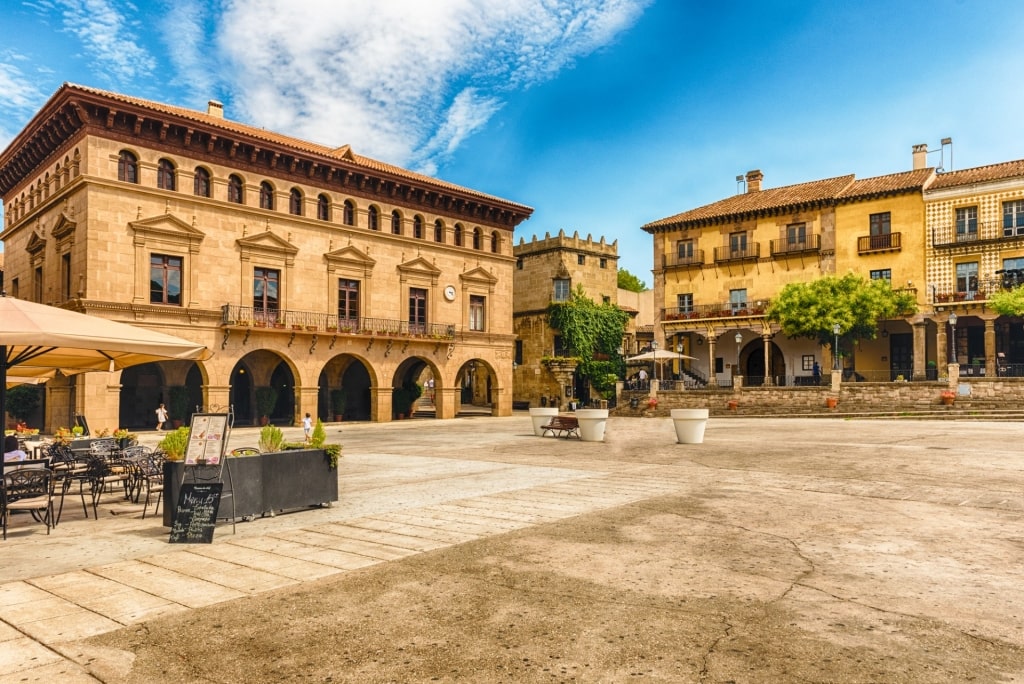
Poble-Sec
Sitting between Raval and Sants in the Sants-Montjuïc district, Poble-Sec is known for its close proximity to the leafy Montjuic hill. Arguably one of Barcelona’s most unique attractions is Poble Espanyol, an open-air museum highlighting Spanish villages across the country.
While it is an artificial city, it’s a great glimpse into what different parts of Spain look like. There are also several craft stores and workshops to learn new skills, such as glass-blowing.
Montjuïc—a name that translates to “Jewish Mountain”—is one of Barcelona’s most picturesque parks. There are several entrances, but many travelers begin their tour of Montjuïc from Plaça España.
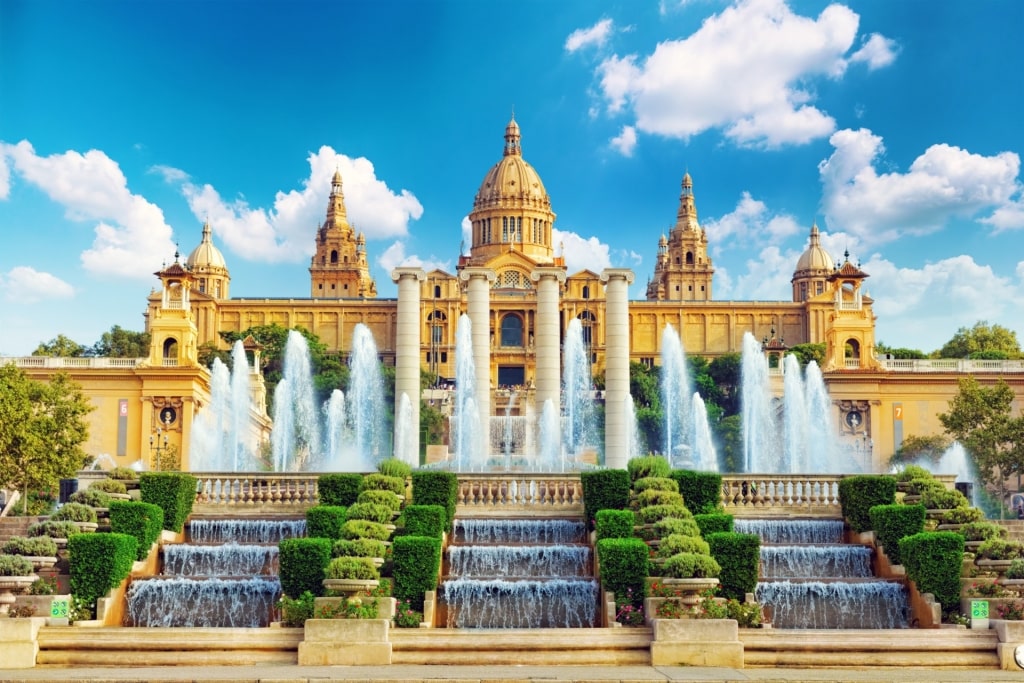
Palau Nacional, Poble-Sec
The Palau Nacional, which serves as a backdrop to the Plaça, houses the largest collection of Catalan art in the world. From here, you can enter the park, weaving along the path and stopping every so often to get different vantage points of the city below.
The Fundació Joan Miró on top of the hill is one of Barcelona’s best contemporary art museums and deserves at least a few hours.
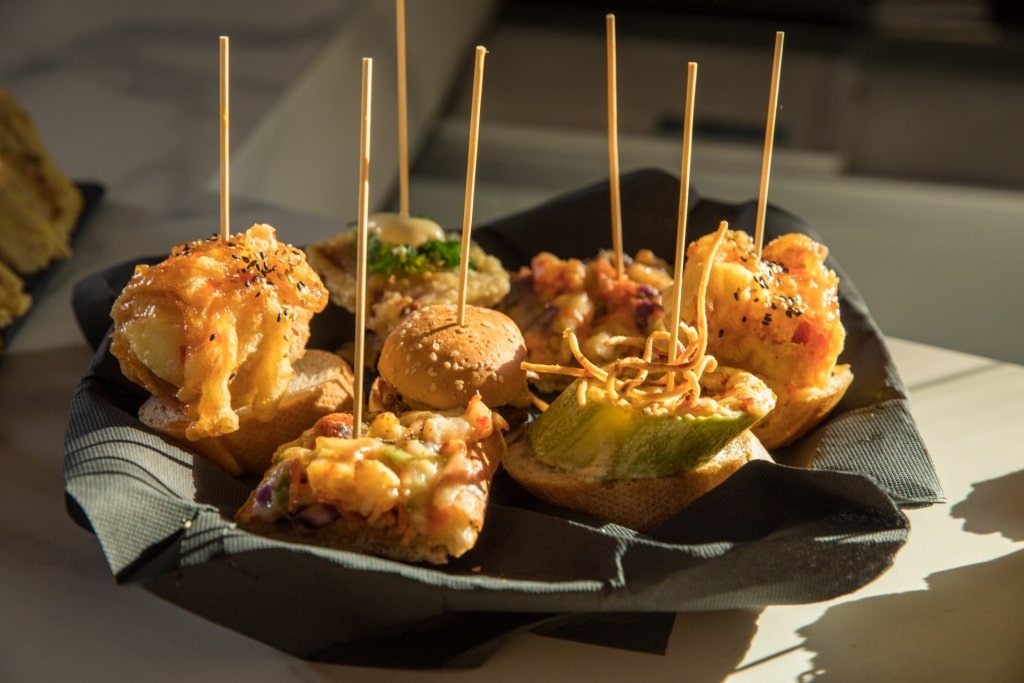
Pinchos
Food is another immersive way to tour Poble-Sec, and this comes in the form of “pinchos” (or pintxos in Catalan), a bite-sized amount of food with a toothpick pushed through it.
Carrer de Blai has been nicknamed “the pinchos street” for its string of bars serving the popular snack. Usually, you’ll eat a pincho or two at one bar, before moving to the next.
These delicious bites can be as simple as jamon Iberico on a slice of bread or as decadent as bacon-wrapped dates.
Sarrià-Sant Gervasi
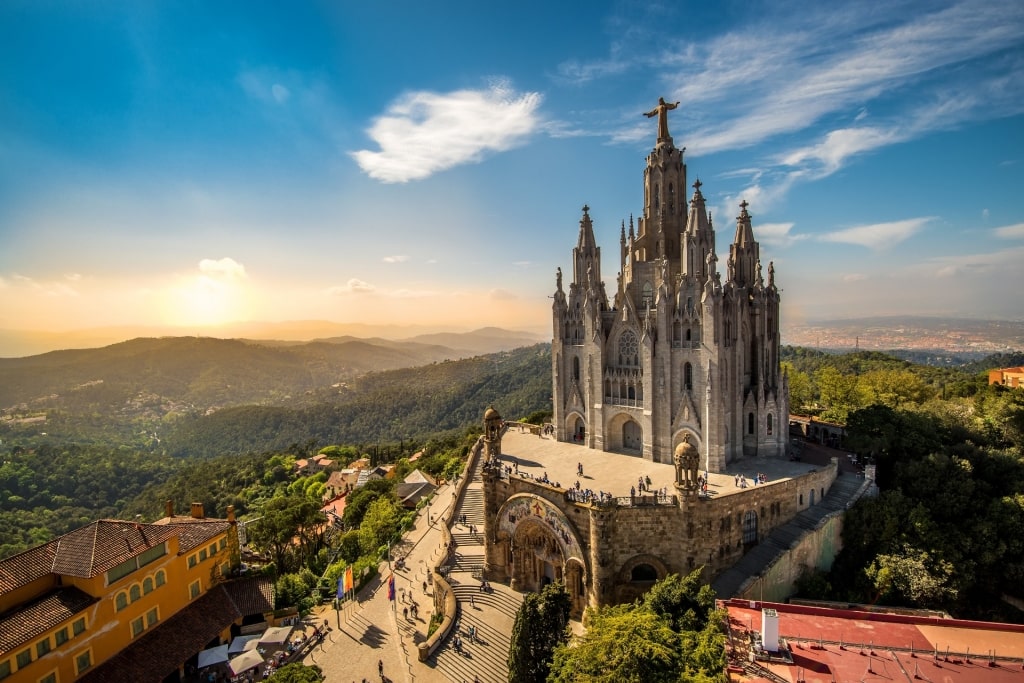
Tibidabo, Sarrià-Sant Gervasi
Added to the city of Barcelona in 1921, this well-to-do district is something of a hike from downtown but well worth the detour, especially if you have at least three days in Barcelona.
Speaking of hiking in Spain, you can literally climb up to Tibidabo—a mountain reaching 1,680 feet—although there are less strenuous forms of transportation, too.
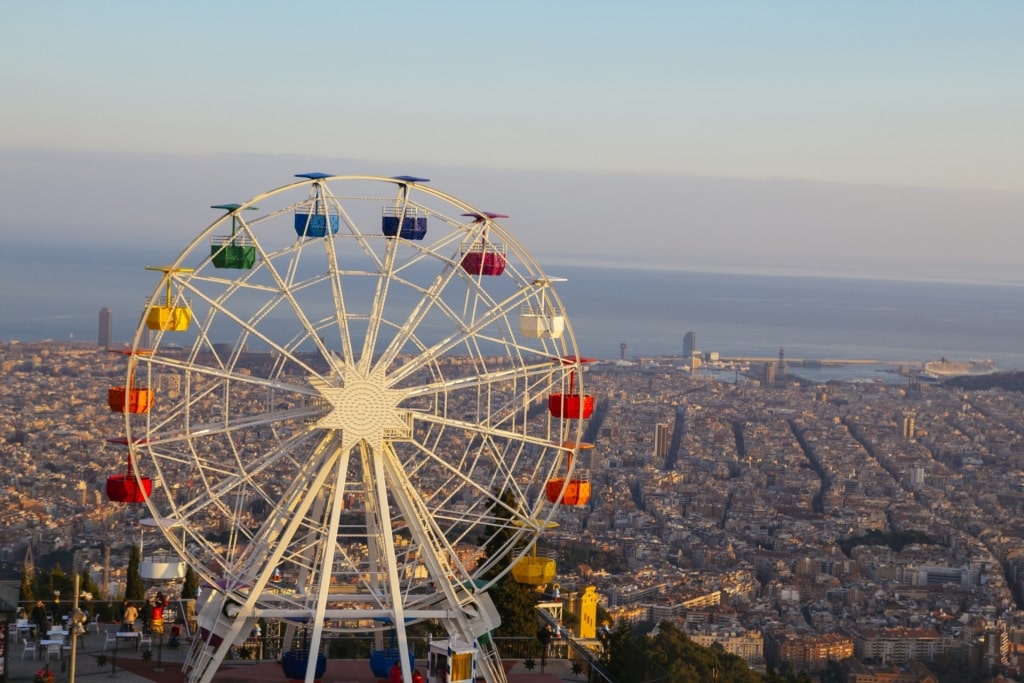
Tibidabo amusement park, Sarrià-Sant Gervasi
Once there, you can visit The Temple Expiatori del Sagrat Cor (Expiatory Church of the Sacred Heart of Jesus) and the Tibidabo amusement park. Views from the top are unbeatable, and you’ll be glad you made the trek.
When you’re back on solid ground, get your sugar fix at Oriol Balaguer in Plaza Sant Gregori Taumaturg. While it seems nobody can compete with the croissants at Oriol Balaguer, you’re sure to find equally tasty baked goods, especially cakes, at La Pastisseria Barcelona.
Let the sweet tour continue with a round of drinks at Hemingway Gin & Cocktail bar. The intimate setting is the perfect place to see and be seen.
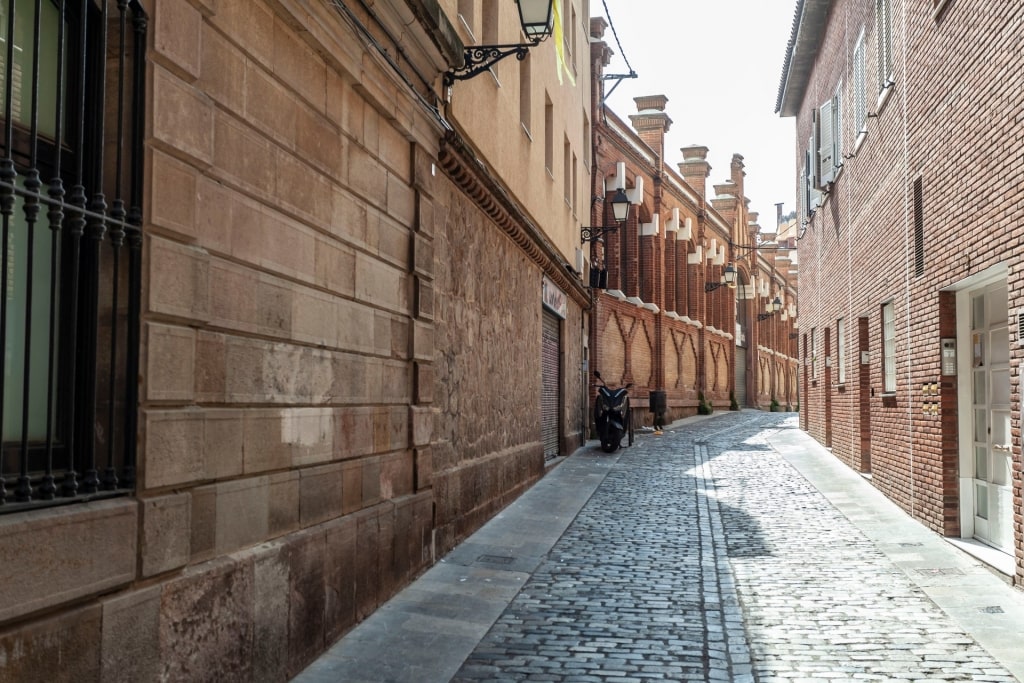
Sarrià
Said to have Barcelona’s best patatas bravas (potatoes served in a spicy sauce), Bar El Tomàs de Sarrià is not to be missed. The no-frills eatery is almost always busy, so expect at least a little bit of a wait.
Pair your plate of piping hot, spicy fries with a cold brew and a couple of tapas. Bar El Tomàs is in the heart of Sarrià, and while still part of Barcelona, it feels worlds apart.
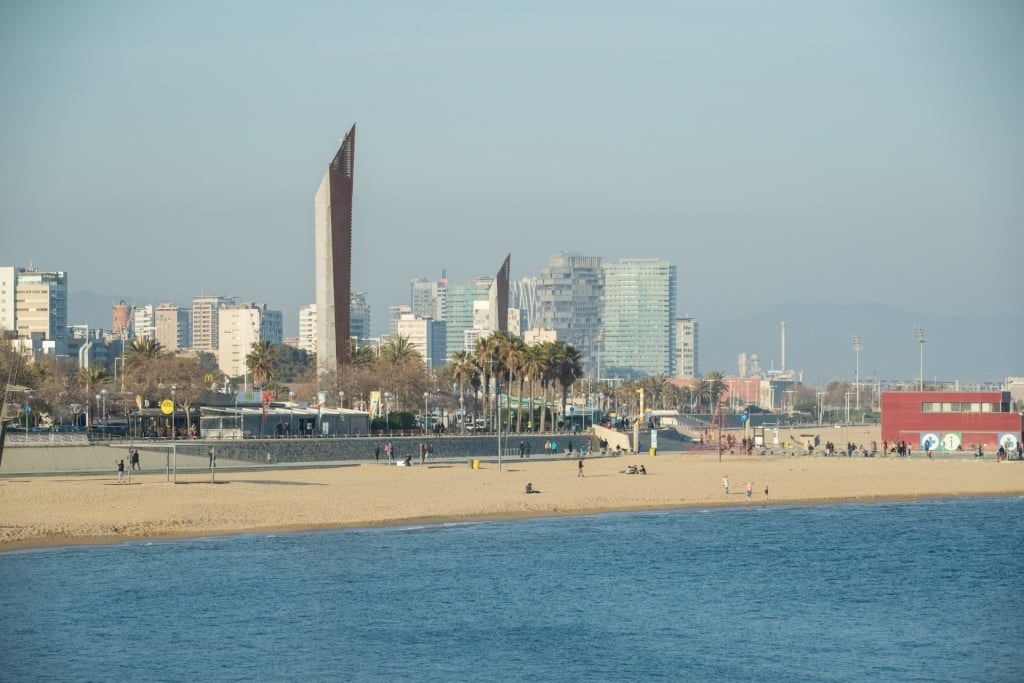
Barcelona
Inspired by this magical city by the sea? Browse our cruises to Barcelona and start planning your vacation to Spain today.
